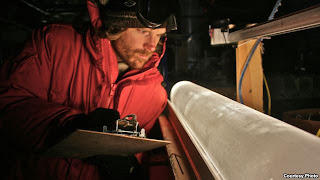Japan would respond with force if any attempt is made to land on disputed islands, PM Shinzo Abe has warned.
His comments came as eight Chinese government ships sailed near East China Sea islands that both nations claim.
A flotilla of 10 fishing boats carrying Japanese activists was also reported to be in the area, as well as the Japanese coastguard.
Mr Abe was speaking in parliament hours after dozens of lawmakers visited a controversial war-linked shrine.
 |
| Chinese and Japanese surveillance ships are monitoring each other closely |
A total of 168 lawmakers paid their respects at the Yasukuni Shrine, which commemorates Japan's war dead, including war criminals, in a move likely to anger regional neighbours who say the shrine is a reminder of Japan's military past.
'Deal strongly'
The warning from the Japanese prime minister was the most explicit to China since Mr Abe took power in December, the BBC's Rupert Wingfield-Hayes reports from Tokyo.
Asked in parliament what he would do if Chinese ships tried to land on the disputed islands, Mr Abe said they would be expelled by force.
"Since it has become the Abe government, we have made sure that if there is an instance where there is an intrusion into our territory or it seems that there could be landing on the islands then we will deal will it strongly," he said.
The warning came as eight Chinese ships sailed around the islands - called Senkaku in Japan and Diaoyu in China.
The Japanese coast guard said it was the highest number of Chinese boats in the area since Tokyo nationalised part of the island chain in September 2012.
China said its ships had been monitoring Japanese vessels. The State Oceanic Administration issued a statement saying three of its ships had "found" several Japanese ships around the islands and "immediately ordered another five ships in the East China Sea to meet the three ships".
Ten Japanese boats carrying around 80 activists arrived in the area early on Tuesday, Reuters news agency reported, monitored by Japanese Coast Guard vessels. Public broadcaster NHK said the boats were carrying "regional lawmakers and members of the foreign media".
Japan's top government spokesman said the "intrusion into territorial waters" was "extremely regrettable". Japan also summoned the Chinese ambassador to protest, reports said.
The territorial row has been rumbling for years but was reignited last year when Japan bought three of the islands from their private Japanese owner.
China claims the island chain, which is controlled by Japan. Taiwan also claims the islands, which offer rich fishing grounds and lie in a strategically important area.
The dispute has led to serious diplomatic tension between China and Japan, most recently in January when Japan said a Chinese frigate locked weapons-controlling radar on one of its navy ships near the islands - something China disputes.
'Backlash'
The visit to the Yasukuni Shrine on Tuesday by lawmakers marking the spring festival is also likely to hit ties between Beijing and Tokyo.
Continue reading the main story
Yasukuni Shrine
- Built in 1869 under the Emperor Meiji
- Venerates the souls of Japan's war dead
- Those enshrined include convicted war criminals
- Japan's neighbours say it represents the country's past militarism
 |
| Visits to Yasukuni Shrine by lawmakers anger Japan's neighbours |
Two cabinet ministers, including Deputy Prime Minister Taro Aso, visited the shrine on Sunday. Prime Minister Shinzo Abe did not visit but made a ritual offering.
South Korea subsequently cancelled a proposed visit by its foreign minister, while China lodged "solemn representations" in response to the ministers' visit.
"Only when Japan faces up to its aggressive past can it embrace the future and develop friendly relations with its Asian neighbours," Foreign Ministry spokeswoman Hua Chunying said on Monday.
But Japanese lawmaker Hidehisa Otsujji said it was "natural" for "lawmakers to worship at a shrine for people who died for the nation".
"Every nation does this. I don't understand why we get a backlash," he said.
Analysis
 Rupert Wingfield-HayesBBC News, Tokyo
Rupert Wingfield-HayesBBC News, Tokyo
The video pictures coming in from the islands today are quite dramatic.
There are more ships than I have ever seen before during one of these encounters - at least eight Chinese ships and an equal number of Japanese coastguard cutters.
Sailing alongside, dwarfed by the larger ships, are 10 fishing boats flying the Japanese flag and carrying right-wing Japanese nationalists from a group called Gambare Nippon.
It is the sort of situation that could quite easily get out of hand if, for example, the Japanese nationalists try to land on the islands, or if the Chinese ships try to board one of the Japanese fishing vessels.
China is now taking the position that its ships are there protecting "Chinese" territory, and consequently have the right to board any "foreign" vessels.
That may be why Japanese Prime Minister Shinzo Abe has decided to be more emphatic in his warning to China, making it explicit that if any of the Chinese vessels attempt to land on Japanese soil, they will be repelled with force.
He is laying down a clear line over which he hopes the Chinese know they would be unwise to cross.
Source BBC




 7:50 AM
7:50 AM
 Trung
Trung

 Posted in:
Posted in: 











